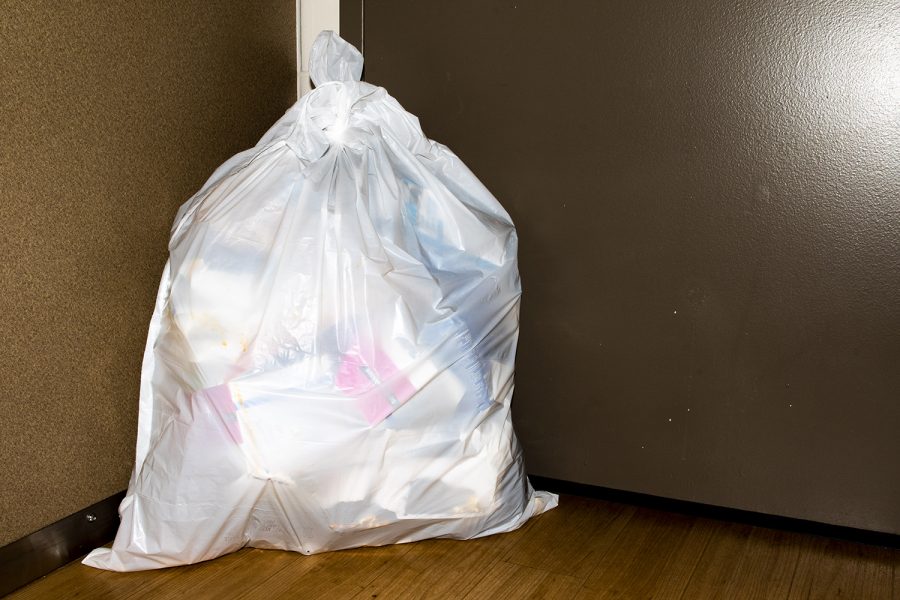UI changes dorm recycling program to help mitigate COVID-19 spread
As the University of Iowa endures changes to mitigate the spread of COVID-19, University Housing and Dining are changing dorm waste policies and removing recycling bins from rooms to ensure the safety of students and staff members on campus.
August 30, 2020
When University of Iowa students moved into the dorms in mid-August, one thing was notably missing from their rooms — a recycling bin.
Formerly provided by the UI, recycling bins were placed in every dorm alongside trash bins before students moved in. The change is one of many the school is taking to protect students and staff members from COVID-19,
Director of Residence Education Greg Thompson said University Housing and Dining began discussing waste management in dorms during conversations about health and safety for the students who opted to live in the ten dorms on campus.
“Once the decision was made that dining was going to be mostly to-go options instead of in-person dining, we knew we were going to see an exponential increase in the amount of trash,” he said. “Because of that, we knew if we were going to maintain our standards for trash removal, it would require more frequent staff presences on the residence hall floors from our custodial staff.”
Thompson said the university decided early to decrease the overall time custodial staff were on the floors to ensure safety for everyone working or living on campus. He also said students were never formally told about the decisions.
RELATED: Recycling rates in Iowa City increase by 30 percent
To ensure safety, students must leave their dormitory and place trash in larger dumpsters outside their buildings after following marked signs throughout their buildings, he said.
One main concern from the UI when discussing recycling is contamination, something that drove the initial decision to change their dorm waste policies.
“We didn’t feel like we would have the type of staffing needed to go in and try to keep contamination out because it is time consuming,” Thompson said. “Sifting through recycling also puts our staff at risk. We have worked hard to ensure [University Housing and Dining] has a robust recycling program, so this is not ideal and we didn’t make the decision lightly.”
Office of Sustainability’s Director Stratis Giannakouros said the UI is still recycling outside of the residence halls, including in market places and dining halls.
“Recycling will continue at the university’s administrative buildings and across all non-residential facilities,” he said. “The hospital, [which] has the vast majority of our recyclables, and the dining halls will continue to recycle.”
He said his office and University Housing and Dining are looking for alternatives to allow students to continue recycling and plan to revisit the issue in the spring.
The Office of Sustainability’s composting bin program for the dorms will continue this fall and will roll out some time in September, said Giannakouros. He said the program allows students to learn about other ways to remain sustainable with more than just recycling.
Some students, however, are frustrated that students no longer have the opportunity to recycle in the dorms.
Emily Manders, co-president of the UI Environmental Coalition, said she understands where the school is coming from, but is still frustrated by the decision.
“It’s upsetting because for some students, the dorms are the first place you have reliable recycling services,” she said. “It’s better to introduce students to how to manage their waste with recycling, and we don’t have that anymore.”
Manders went on to say that losing the bins means students lose a chance to learn living skills.
“Taking recycling away takes away an introduction to sustainability that some people have never had,” the student leader said.
While the UI continues to look for alternatives, Giannakouros said it’s important for students to know and explore other ways to remain sustainable.
“Although it is really important to recycle… it isn’t an answer to our sustainability problems,” he said. “It’s a way to make sure we’re doing the least damage we can do. It’s more important to look at our upstream activities and consumption to ensure we’re using more environmentally friendly products in general.”






